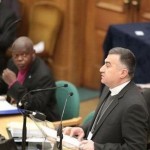
Revd Chris Dobson reports on February's General Synod, which opened with a moving address from Archbishop Bashar Warda, Chaldean Diocese of Erbil in Iraq.
Archbishop Warda spoke about the displacement of Christians from Iraq and the daily struggle for survival. He appealed for our prayers, our advocacy and our money to help the church rent homes for displaced families.
Brothers and sisters. During the past year more than 125, 000 Christians have been forced to flee from their villages only because they chose to remain Christians and refused the conditions imposed on them," Archbishop Warda told Synod. "They had to leave at night, under the cover of darkness. Many of them trod their own path of Golgotha for long hours, having left everything behind, other than their bare clothes. Arriving on foot, they sought refuge in the relatively secure region of Kurdistan, having no idea as to whether they would ever be able to return to their life-long homes.
You can read Archbishop Warda's speech here and you can also listen online to an interview with him.
Archbishop Justins presidential address
was on the theme of Christian witness and evangelism. Joy and delight in a loving God are at the heart of Christian witness, evangelism is the overflow of God's love for us.
The audio and full text of the Archbishops speech isavailable here.
Four senior women clergy, including the Rt Revd Libby Lane, reported back on a visit to India
in which they were immersed in the life of ordinary Indian women, living in their homes and sharing their lives. They shared how transformational the visit had been for each of them personally. It was a good illustration of the value of our own link visits which are increasingly being shaped on an immersion and pilgrimage model.
Draft Amending Canon No 35 (GS1964b) was made, promulged and executed and enables Bishops to delegate the approval of communion assistants in a local church to someone else, iethe PCC or vicar.
Group work on Renewing and Reforming the Church:
On the Wednesday, Synod was divided into small groups for a general discussion about discipleship, after which four larger groups were created to reflect on a number of major reports aimed towards reforming the structures of the church to promote growth.
Resourcing the future laid out plans to use funds that are distributed from Central Sources for two priority areas: places demonstrating a commitment to growth and places that are materially deprived, a bias to the poor. This would involve changes to the current system of formulas to decide how clergy are deployed.
Resourcing Ministerial Education was more controversial, containing proposals that would give more power to Dioceses to decide how best to offer training for ministry, but might also have implications for the future of residential training colleges.
The Simplification report was warmly received as a positive attempt to simplify some of the church bureaucracy so as to release more time and energy for mission and Synod encouraged the Business Committee to prepare the necessary legislation for more detailed scrutiny
Discerning and Nurturing Senior Leaders a report looking at how we identify and best equip people who have particular gifts in leadership for the future and making recommendations for replacing the current system of preferment with a more open and transparent means of apprenticeship and training.
Church Commissioners Funds and Intergenerational Equity: In order to make the proposed reforms possible General Synod was invited to give their view of the proposals from the Commissioners to release funds that would normally be capital preserved for the benefit of future generations. Recognising that unless we spend the money on growth now there may well not be a church in the future. While the decision rests solely with the Commissioners it was good for them to hear that the General Synod has given them overwhelming backing for any such move.
In all these debates, because of the nature of the funding, the emphasis was on training and equipping clergy for change, but General Synod were constantly reminded that without the laity we will fail.
The full proposals and individual reports can all be found on the Church of England website, while you canlisten to all of the speeches including the task group debateshere.
Pastoral provision following suicide:
A debate was held on amending Canon B38 which states that in certain situations the normal prayer book provision should not be used, including some suicides, to reflect the pattern of usage by clergy today. The debate included moving contributions from Synod members of their personal experience of suicide by loved ones, and recognised the deep pastoral need to care for the families of those who had been driven to take their own lives.
Supporting and resourcing the rural church:
On the final day a major report was received by the Synod, Released for mission, growing the rural church. Five priorities were identified by the report:
-
Building a culture of discipleship appropriate to the rural context.
-
Envisioning, enabling and equipping the ministry of lay people.
-
Effective training, support and resourcing of the clergy and lay people in rural multi-church groups.
-
The simplification of governance and legal structures, the requirements for offices and the need for administrative resourcing.
-
Facilitation of creative ecumenical partnerships.
The full Released for mission reportis available here.
Further information about rural ministry can be found at www.arthurrankcentre.org.uk.
Baptism liturgies for use with children present:
New liturgies for use at Baptism were debated again and sent for the last revision stage before being brought back for final approval at the July sessions.
Other resources showcased at Synod include:
The Pilgrim Course: www.pilgrimcourse.org.
The resources for shared conversations on scripture, mission and sexuality are available at www.sharedconversations.org.